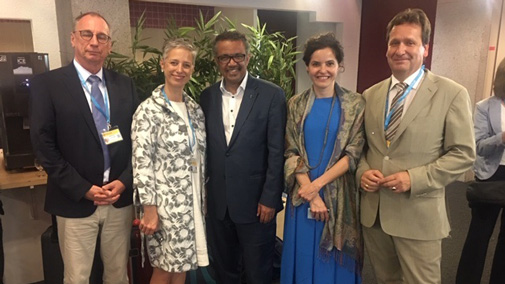50 years ago this month, Neil Armstrong and Buzz Aldrin were the first humans to walk on the moon.
Earlier in the decade, in May 1961, President John F. Kennedy gave a speech at Rice University that set the stage for this – his words are immortal:
‘We choose to go to the moon,’ the President said. ‘We choose to go to the moon in this decade and do the other things, not because they are easy, but because they are hard, because that goal will serve to organize and measure the best of our energies and skills, because that challenge is one that we are willing to accept, one we are unwilling to postpone…’
Since being re-elected in May 2019 to serve a second term as President of WCPT, I have been reflecting on the sentiment in these words and have asked the question – what activities should we, as a global organisation, be doing ‘not because they are easy, but because they are hard’? I have some ideas but I am also very interested in hearing from our community.

In February 2017, the World Health Organisation’s Rehabilitation 2030 initiative was launched. This week in Geneva, the second Global Rehabilitation 2030 Meeting was convened.
Imagine a world where every person who needed rehabilitation was able to access high-quality, person-centred rehabilitation in a timely way and at no financial hardship. How would this happen? It is a huge challenge and at the meeting a Guide for Action for WHO’s Member States was launched with a view to helping governments strengthen their health systems in order to provide rehabilitation.
However, what can we do as a global organisation and a global community? Alarcos Cieza, Coordinator for Vision, Hearing, Rehabilitation & Disability at WHO, writes that as stakeholders we need to address two fundamental issues – ‘ideas’ and ‘actor power’ (Cieza, 2019).
She suggests that the global rehabilitation community must work towards both a common understanding and a unified description of ‘rehabilitation’ contextualised more clearly as how it enables functioning – this is something physiotherapists do every day and if we don’t, we should!
The consistent message should be rehabilitation is a health strategy that optimises function and of course we must highlight and understand the role of PT within the team.
However, when it comes to ‘actor power’, Cieza suggests that in order to ensure rehabilitation becomes a political priority, professional groups need to be even more unified. This is where WCPT can and does work with other professional organisations in alliances such as the Global Rehabilitation Alliance to leverage collaborative advantage and demonstrate a unified voice for advocacy.
In addition, WCPT can assist our member organisations in their advocacy initiatives through capacity development work, through the provision of technical reports and evidence-based resources and by amplifying the message of WHO. Through our committed and expert volunteers, we will continue to support WHO in its work.
Demonstrating leadership in this key health agenda is crucial for WCPT. It will require the best of our energies and our skills. It will take longer that the 4-year term I will serve. But we will do it, not because it is easy but because it is right. This is one of our ‘moon-landing’ projects.

